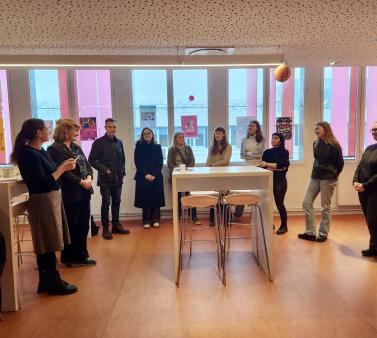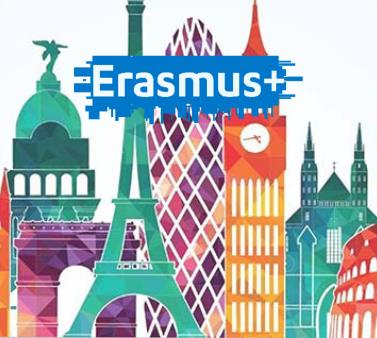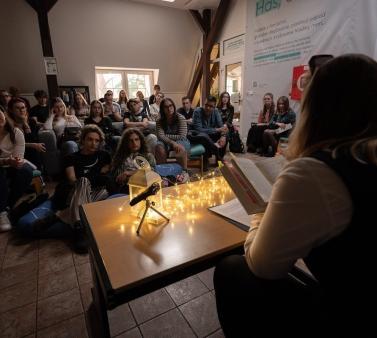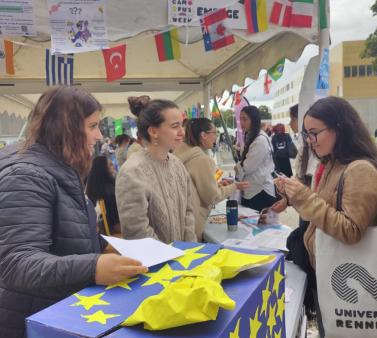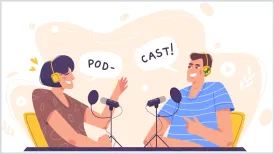
Could you tell me a bit about this particular project, who it's aimed for and its development?
Madelyn Lines: Certainly. Well, at Rennes 2 University, we already have a team of faculty, staff and even graduate students who are involved in university research projects that focus on innovative teaching methodologies and language-specific pedagogies tailored for language educators. This current project, "Innovative Teaching Approaches and LSP for Language Teachers", builds on the work that we’ve been completing so far, notably through the projects: Air DEMOES, TRIP, and GAMELand.
To give you some background, the Air DEMOES project is centered on the building of virtual worlds within the virtual domain of the Language Space, entailing the development of didactic tools and the promotion of language-learning activities. Similarly, the TRIP project endeavors to forge a comprehensive framework for internationalization within domestic learning environments, integrating international and intercultural dimensions into formal and informal curricula for all students. The GAMEland project focuses on enhancing language skills through a gamification approach to provide a free, accessible, multilingual tool available to everyone.
This current project, "Innovative Teaching Approaches and LSP for Language Teachers", strives to enrich language competencies and language-teaching content. It’s our hope that once participants complete the two parts of the program, they’ll have acquired new tools and approaches, coupled with an improved set of soft skills that will help them succeed in the long-term.
You mention the two parts of the project, could you please tell me more about the format you’re using and who will be participating?
The project has been developed within the framework of the Erasmus+ Blended Intensive Programme (BIP) format, and it essentially includes 2 parts: a remote component online, and then, at a later date, a short international mobility component. Last year, we were already part of a BIP (‘Trauma Informed Teaching’), coordinated by the University of Limerick and the other partners of our strategic European University Alliance, EMERGE. We wanted to share expertise that was recognised at Rennes 2 and get closer to all the partners with whom we had a good dynamic but who we didn't see often. So when we developed this current BIP, we extended the invitation to participate to our partners as well as the foreign language teaching faculties (French and English) of other universities. But we are open to all fields of study since this is also about digital learning.
In the end, the individuals who will be participating come from: Europa Universitat Flensburg (Germany), Matej Bel University (Slovakia), Adam Mickiewicz University (Poland) and the Université de Galati Roumanie (Romania). Some of the participants are undergraduate or graduate students who are likely to be language teachers in the future, but in other cases, some are already teachers who are looking to expand their repertory of teaching tools and techniques.
So the remote component was held on September 20th and included a half-day conference with identified coordinators to discuss the specific content of the project, and participants were provided with preparatory work even ahead of that date. The physical mobility component taking place during the week of October 14th will see the different participants coming together on Rennes 2’s Villjean campus to continue the activities and complete the production of tools and scenarios they’ve built thus far. Both components include a number of tools such as immersive scenarios and simulations.
We will also have participation from members of the Gameland consortium for 2 days: Burdur Mehmet Akif Ersoy University (Türkiye), Università degli Studi di Napoli Federico II (Italy), Lviv Polytechnic National University (Ukraine) as well as Smarted SRL (a scientific research start-up). There will also be a game creation company, called Ikigai, who will be doing a workshop during the week of the 14th.
Could you tell me more about what was included in the remote component as well as what participants will do during their physical mobility work at Rennes 2?
For the first half of the program (the remote component), we organized an online three-hour course where everyone was able to play a few online language-learning games on the virtual space of Rennes 2: WorkAdventure. The room in this space was created specially for this BIP by Dolly Ramella (Educational Engineer and Digital Project Manager for the Espace des Langues), Pierre Marguerie (an intern working with LIDILE), and students from the Master's Language Didactic program at Rennes 2. Within the framework of developing creative tools for teaching, her team created virtual escape rooms and other workshops. They did a wonderful job of creating them and helping us to guide people through the virtual space.
Participants had two narrative stories in the rooms that they were able to try out, including an Alice in Wonderland themed version. This was partially recreated on the online space, and will be implemented as a real escape game (with the help of the SMARTED team) during the upcoming week. There was a second part where they were able to start creating their online escape room while having the possibility to use AI tools since we're also working with the implementation of AI in the creation of language-learning games and games for speciality languages.
Additionally, we provided them with a few resources that they could use at home, including: a mind map of different AI tools they could use to create images, scripts, to touch up videos and edit audio files. They were encouraged to explore these resources in order to be able to create more efficiently and to get them used to employing these tools in their courses for future teachers or for university professors.
Once they arrive at Rennes 2, they'll be able to carry on with their escape room creation and hopefully finish them. But there will also be other activities - like a visit of the campus, the city and more. For Erasmus Days, we'll also be creating podcasts with AI that the students will create on the virtual space of Rennes 2. And everything will be bilingual in French and English to allow everybody to fully understand and participate in the workshops.
What are some of the benefits from your point of view of developing this kind of a project as a BIP as opposed to within a regular semester course at each individual institution?
The diversity which is inherent in this kind of program is incredibly important - we have teachers, PhD students, undergraduates and graduates from different parts of Europe. And they all have different skill levels and knowledge bases when it comes to online work, AI and even the gamification of language-learning. Some participants struggled at first in comparison to others, but they got the hang of it after a short amount of time. It was also really interesting seeing people generally interact and help each other as well during the escape room.
I found that, overall, it’s been a pretty unifying experience thus far. Maybe even more so than when you’re exclusively working with students who are all from the same course, field or university and culture. Even for our Rennes 2 team, it’s a similar feeling - it makes us work together differently. It's not just one teacher leading a BIP, but rather a pretty big team of individuals each managing different moving parts of the equation. And, hopefully, our students who are working with us are also learning how to work successfully with all the moving parts. It should definitely be helpful to them moving forward in their studies and careers.
-------
This project was developed by Professor Christine Evain, Professor Elisabeth Richard, Griselda Drouet (Senior Lecturer in French Linguistics), Madelyn Lines (Educational Project Engineer and Project Coordinator), Dolly Ramella (Educational Engineer) and Pierre Marguerie, (Intern for LIDILE). The team worked together with the support of the Rennes 2 International Office.

